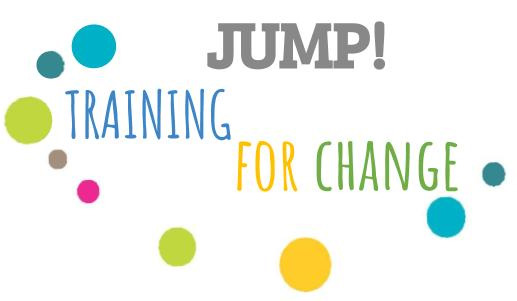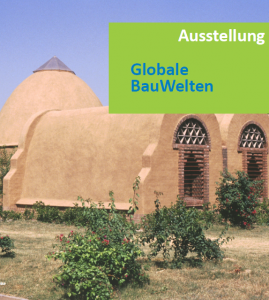Erasmus+ Projekt zur pädagogischen und didaktischen Train-the-Trainerausbildung
Mehr zum JUMP-Projekt auf der Projektwebseite: http://www.trainingforchange.eu

JUMP! is a project aimed at building trust and upgrading competence for trainers in ecological building. For this, a new common core curriculum, units of learning outcomes for trainers and tools for these trainers will be developed and tested.
BACKGROUND
At the heart of the new curriculum and tools is the desire of the consortium to enhance a paradigm shift. As Albert Einstein stated a hundred years ago: “The significant problems we face can not be solved at the same level of thinking we were at when we created them.” Sustainable building cannot be achieved only by new technology. The new manner of thinking Einstein refered to includes non-technical and non-materialist aspects. We believe that change is a major motivation that drives designers, builders and customers of eco-construction and that change can and should be explicitly included in the learning process.
The second focus of training for trainers that we will develop is on how to access and best use all the guidelines and resources that have been produced thanks to our European networking over the last 15 years.
The consortium focuses on earth building and straw bale building, two sectors with strongly developed regional, national and European grassroots networks. Wood, hemp and other natural fibres used for construction which are closely linked to forestry and agricultural which have closer links to industrial processes and organisations with teaching schemes and strategies which usually follow a different logic. Nevertheless, the project’s outputs can be applied in these sectors and we will encourage it’s use in mainstream initial VET training for the conventional construction.
Currently, building with earth and straw bales is mainly taught by craftspeople outside of the mainstream training pathways of the construction sector. Many small, specialised training providers, often NGOs, have been developing all over Europe for more than 30 years. European cooperation was been initiated in 2002 to create common teaching materials for earthen plasters that remain the most significant part of the market for natural building materials in many countries. From 2008, there has been a noticeable increase of promotion, teaching and building activity for the ecological construction sector. Since 2009, units of learning outcomes for clay plasters exist, based on the ECVET principles. With the growing demand for straw bale houses and for earthen architecture, even in the public sector, there is a growing need for skilled craftspeople and for specialised trainers.
JUMP! is the first time that the earth building and straw bale building organisations have joined in a common project. A first even though there has been a close connection between the earth building and straw bale building networks at a European level. Straw bale buildings are almost systematically associated with earth as a building material in various ways. Many of the training providers teach the use of both materials. In some countries there are separate national umbrella associations for the two materials but in others associations promote both. The development of professional training in straw bale projects took over some of the pedagogical approaches developed by the earth builders and adapted the processes and tools to their context: i.e. teaching modules and competence standards based on ECVET.
So far, the two networks have had different strategies for training and for training for trainers. For earth construction, the training for trainers initiatives started in 2005 but remained rare, mostly non-recurrent and only a few addressing the units of learning outcomes approach. For straw bale construction, the establishment of codes of practice in some countries has enhanced the teaching and therefore the training for trainers in the recent years.
European projects funded under Leonardo da Vinci and Grundtvig programs have created high quality and consensus based resources for learners, trainers, assessors and training centres for straw bale and earth building. The results and products are translated and scattered unevenly on different associations’ and projects’ websites, including this one.
Despite the growing awareness around healthy buildings, indoor climate and natural, low carbon materials, there is still a huge ignorance in the mainstream construction sector when it comes to earth and straw bales as building materials. The specifics of these materials, the associated design and technology are not recognised. Qualifications entirely dedicated to these processes are rare and only concern continuous training. Training funds are steered by governments at local, regional or national level, generally with little or no understanding of earth and straw bale construction. In building regulations sustainable construction usually means limited to thermal performance. In this global context, trainers in eco-construction are not supported nor recognised. In the context of our eco-construction training centres, they often teach only occasionally, in a particular module according to their professional competence. Most of them do not have a pedagogical background and even their construction skills have been built up throughout their building practice, learning by doing, often after career changes, and not based on formal training. On the other hand, studies have shown that teaching and training in eco-construction is at a high level in comparison to other sectors. So the competence already exists in our networks and cooperation will allow good practice to spread.
OBJECTIVES
- To work out a European vision of the specificities and values of vocational training for eco-construction:
– elaborate a common definition about eco-construction and about teaching it, integrating the technical/technological and the societal/human aspects
– elaborate a competence standard (units of learning outcomes) for trainers in eco-construction - To allow for up-grade and harmonisation of the teaching skills of the trainers
– create a common curriculum and materials to train trainers in eco-construction
– encourage innovative teaching practices that fosters a positive attitude to change and also to equity, diversity and inclusion
– raise awareness about European added value and support the trainers to implement our European competence standards and use the existing resources - To improve access and dissemination of resources and training and assessment offers by joining our earth and straw bale networks’ on-line channels
– create a collaborative and common European web portal for straw bale and earth building training, addressing learners, trainers, assessors, training centres and certifying bodies, including a dynamic on-line calendar for training and assessment offers
NEEDS
NEEDS OF SOCIETY
- – The development of studies, policies and support for the development of bio-sourced and short-chain pathways in France and Europe is an opportunity to develop qualified vocational training around ecobuilding giving a large place to the earth and straw.
- Europe definitely needs good (better) training and education in natural building, to enhance the building-market, guarantee the quality and competence of the craftsmen and offer security to clients, who want to build in a more sustainable way.
- – Connect! (Links are as important as the elements of the system)
- Without a vision technologyis aseptic
NEEDS OF OUR NETWORKS on a European level and needs of national organisations
– define “sustainable”
define the current state for construction, for the trainers
make a frame as open as possible where everything fits in
methods to evaluate
- buiilding systems
- materials
- technology
- CO2, LCA (life cycle analysis
understand LCA: different choices lead to different effects
global approach
knowledge to evaluate the effect (ex. same value, different effect)
Change =
- new/unknown
- evolving continuously
- freedom
- confidence
– Trainers as well as trainees also need a better understanding of the economical/financially factors, which lead to the final prize of an ecological building (calculation). Especially the part of the logistics (craftsmen, materials, time schedules) can save a lot of money, much more than the participation in the building process. With such a knowhow trainers can educate trainees (future craftsmen, start-ups, building companies) not only in the competences of natural building but also in their ability to offer their work to much wider target groups.
NEEDS OF THE LEARNERS
– Strawbale and earth building projects are out of the framework => be prepared while asking for a job/ asking for permission to build
– learn for real life:
- prepare for future job
- prepare for building own house
with ‘unususal” materials
(self) confidence TILLIT
– change =
- new/unknown
- evolving continuously
- freedom
- confidence
creativity (what can I do with the hole?)
– experience cooperation and communication
cooperate with builders:
- transfer the knowledge to workers used to conventional materials
- communicate about the objectives of the work in progress
communicate with clients:
- understand how their vision and ideas fir with the project/with the natural materials
communicate with politicians:
- clarify information
- put a framework
- relate with reality
– direct experience (doing, visiting) more effective than talk
NEEDS OF THE TRAINERS
- How to be recognized, accepted as a trainer ? (Label? Accreditation?)
- share assessment practice
- teaching materials, lesson plans
- tools to elaborate teaching materials together/ share/ improve
- confidence introducing new pedagogical approaches and tools for delivering outputs of learning in the green building sector.
- little knowledge of European work
They exchange very few between themselves at national and European level, or on a small common denominator (a technique, a material …), and thus do not share a culture identified in terms of technical and pedagogical tools, codes and practices. This results in a wide variety of approaches to sustainable development. If this diversity seems to allow complementarities, it would be more beneficial if these approaches were articulated within a collective discursive universe.
NEEDS OF THE TRAINING CENTRES
- provide trainers with teaching tools
- market the training and assessment offer TAO
- train / professionalize trainers
- methods to assess trainers competence
- capter/transcrire le savoir-faire des artisans
- trainers aware of / familiar with/ able to
– There is a history (or herstory) of the organisation, of the qualification, of the network etc.
– building site organisation skills
– how to organise mobility
– necessity to continue to learn themselves
– accompagner
NEEDS OF THE MOU SIGNATORIES
Data base
Information flow
, initiated by actors heavily involved in local development, social economy The strength of this
TARGET GROUPS
Trainers working for small training centres, most of them are not permanent trainers and also work as craftspeople, many having their own business
MoU signatories
ADDED VALUE OF A TRANSNATIONAL WORK AND CONSORTIUM
– Reinforce our network dynamics: increase of knowledge and confidence between training centres, with the aim to increase mobility opportunities including assessment of learning outcomes for learners
– Broadening the vision and knowledge of trainers on the diversity of vocational training practices in European eco-construction
– Modular training programme on ecological building do not exist in some countries so developing the framework for this is a prior interest and doing this in a European-wide collaborative way seems to be the right approach
– Harmonizing skill, share and development of training resources at European level is one more step toward creation of the conditions for the implementation of European mobilities for trainers and trainees in vocational training in eco-construction
The European dimension is a reality and a willingness of the actor in training practices, mobility of people and the transfer of know-how that accompanies it.
Creation of a network dynamics: increased knowledge and trust between vocational training organizations and eco-construction.
Broadening the vision and knowledge of trainers on the diversity of vocational training practices in European sustainable development

ABOUT JUMP!
The « JUMP! Training for change » project has been funded with support from the European Commission.

